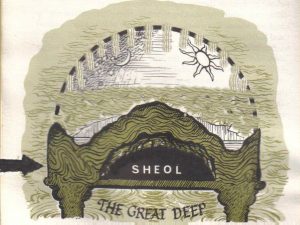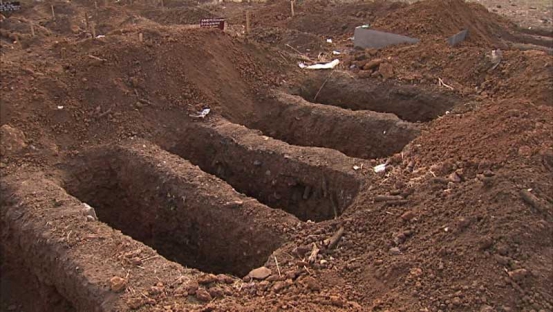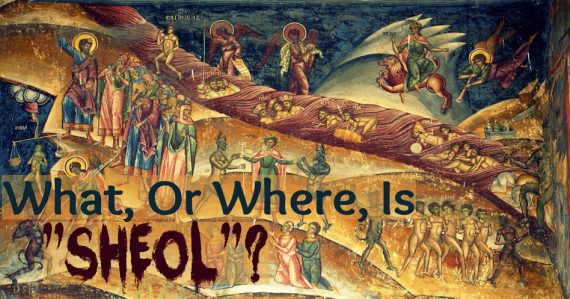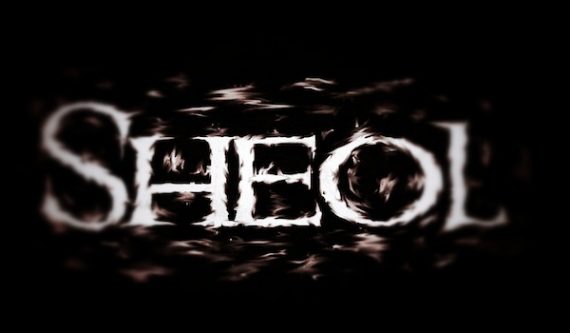(#AmazonAdLink)  My book, (#AmazonAdLink) What is Hell? is now available (#AmazonAdLink) on Amazon. I am doing a series of podcast studies that focus on some of the content from the book. The studies look at the eight key terms that are often equated with hell, and about a dozen key passages that are thought to teach about hell.
My book, (#AmazonAdLink) What is Hell? is now available (#AmazonAdLink) on Amazon. I am doing a series of podcast studies that focus on some of the content from the book. The studies look at the eight key terms that are often equated with hell, and about a dozen key passages that are thought to teach about hell.
If you want to learn the truth about hell and what the Bible actually teaches about hell, make sure you get a copy of my book, (#AmazonAdLink) What is Hell?
Also, if you are part of my discipleship group, there will be an online course about hell as well.
In this study, we look at the word sheol.
The Hebrew word sheol is the most common word in the Old Testament that is used in reference to the state of the dead.
Curiously, however, the word appears only one time outside of the Old Testament, where it means ‘grave.’ So when it comes to understanding what the Old Testament authors meant with the word sheol, we are limited to its usage within Scripture itself.
Thankfully, there are numerous passages which guide our definition of this word.
The Meaning of the Word sheol
The word sheol occurs sixty-six times in the Hebrew Scriptures, and a few of these are occasionally translated as “hell” depending on which Bible translation you are reading.
Yet “hell” is not a good translation of any of the occurrences of sheol in the Bible.
The Hebrew bible never indicates any form of punishment after death, so this translation is inappropriate. This is seen in a variety of ways.
For example, both good men and evil men go to sheol (cf. Gen 37:35; Num 16:30; Jon 2:2).
 Since it is not a place only for wicked and evil people, for even the righteous go to sheol, it cannot be equivalent to the modern concept of hell. Some teach, therefore, that sheol was a special “holding tank” or “intermediate state” for all people who lived and died prior to the death and resurrection of Jesus, and that after the resurrection of Jesus, people no longer go to sheol, but are immediately sent to either heaven or hell.
Since it is not a place only for wicked and evil people, for even the righteous go to sheol, it cannot be equivalent to the modern concept of hell. Some teach, therefore, that sheol was a special “holding tank” or “intermediate state” for all people who lived and died prior to the death and resurrection of Jesus, and that after the resurrection of Jesus, people no longer go to sheol, but are immediately sent to either heaven or hell.
Texts such as Matthew 27:52, Ephesians 4:8-10, and 1 Peter 3:19 are used to defend this idea.
However, when all the references to sheol are considered together, it appears that the most likely definition of the word is also the most literal translation.
The word sheol means “grave” or “pit.”
When Hebrew authors wrote about sheol they were thinking about a hole in the ground in which dead bodies were laid. It does not represent any sort of afterlife experience.
When adjectives are used to describe sheol, it is portrayed as a wet, dank, dark, dusty, musty hole.
Support for this understanding is found in the fact that the Hebrew word bor is often used as a synonym for sheol, and bor is literally a hole dug in the ground (cf. Isa 14:11-20).
And much like any grave, sheol is characterized by the presence of worms and decay (Job 17:13-16; 24:19-20).
There is not a single Old Testament text which speaks of sheol as an eternal place of suffering and torment for the unregenerate dead.
Even when New Testament authors quote Old Testament texts which speak about sheol, they do so in connection with the bodily resurrection of people from the grave (cf. Psa 16:10; Hos 13:14; Acts 2:27; 13:35; 1 Cor 15:55).
The idea is that their bodies went into the ground, and at the resurrection, their bodies will come up out of the ground, and be made whole and complete once again. So even the New Testament supports the idea that sheol is simply “the grave.”
And since all people die and go to the grave, it makes sense for the Old Testament texts to speak about all people going to sheol.

The Old Testament, therefore, does not have much to say about the afterlife for either the righteous or the wicked. All it knows is that when all people die, they are put down into a grave, into sheol, where worms and decay destroy their bodies.
As such, the word sheol has nothing whatsoever to say about “hell” and should not be translated as “hell” in any of its uses (contrary to KJV texts such as Deut 32:22; Psa 16:10; Prov 9:18; Isa 14:9-10).
The best way to translate all uses of sheol is “grave,” and it literally refers to a pit or hole dug into the ground in which dead bodies are laid. When used metaphorically, it can refer to depression, sorrow, or loneliness, which are emotions often associated with death and burial.
So what is sheol?
The term, sheol, therefore, is the theological opposite of the life that God wants and desires for His people.
Since God is a God of the living, not the dead, then sheol represents the experience of those who are not functioning as God desires, whether it is because they are dead and buried in the ground, or because they are cut off from community due to loneliness and depression.
There is not a single text that describes sheol as a place of suffering and torment in the afterlife for the unregenerate dead.

So the Old Testament teachings NOTHING about hell
The word sheol is the only possible Old Testament term that can refer to hell, and since it does not, this means that the Old Testament teaches nothing about hell. (The image of fire might refer to hell in a few passages, but we will discuss this in a later study. … or you can just (#AmazonAdLink) get my book on hell …)
This helps us realize that if the doctrine of hell as a place of suffering torment is correct, then God left humanity completely ignorant and blind to this idea for most of human history.
If it is true that the vast majority of people from the days of Adam to the days of John the Baptist will end up in a place of burning torment forever and ever, wouldn’t it have been loving for God to at least warn people about such a potential fate?
Yet there is not a single such warning in all of the Hebrew Scriptures.
Yet despite the complete silence in the Hebrew Scriptures about eternal conscious torment in hell, people today continue to hold to the doctrine, primarily because they believe it is taught in the New Testament.
As we will see in future studies about hell, nearly all the evidence provided for the doctrine of eternal torment in a fiery hell comes from the New Testament.
But again, if this is truly the case, then was it just and right for God to not warn a single person prior to the birth of Jesus about the eternal torment that awaited them in eternity?
Was it Right For God to Fail to Warn Billions of People About Hell?
Is it conceivable that the God revealed to us in Jesus Christ could watch billions of humans fall into a pit of eternal suffering and torment while never saying a single word of warning about it to those who were alive?
If the traditional doctrine of hell is true, how could God have overlooked or neglected mentioning it in His revelation to humanity for the majority of human history?
People often say that it is loving to warn people about hell, just as it is loving to warn people about driving off a cliff. But if this is so, why did God not warn people about hell for most of human history?
Is God unloving? To ask the question is to answer it. God is infinitely loving, and would not have failed to warn the objects of His love about such a potential disaster.
Therefore, the only other rational conclusion is that such a disaster does not exist. God didn’t warn people because the warning was not needed.

Yet despite the complete silence in the Hebrew Scriptures about eternal conscious torment in hell, people today continue to hold to the doctrine, primarily because they believe it is taught in the New Testament.
Nearly all the evidence provided for the doctrine of eternal torment in a fiery hell comes from the New Testament. But if the Hebrew Scriptures do not teach the concept of eternal torment in hellfire, it is legitimate to ask whether the New Testament does.
Maybe we have misunderstood what the New Testament teaches about hell as well.
The New Testament contains seven terms which are thought to refer to hell. They are: abyss, gehenna, hadēs, outer darkness, tartarus, the Lake of Fire, and the image of fire. We will consider all of these, along with several passages from Scripture, in future studies.
If you want to learn the truth about hell, and what the Bible actually teaches about hell, make sure you get a copy of my book, (#AmazonAdLink) What is Hell?
I will also be teaching about hell in my Gospel Dictionary online course:
 Do you have more questions about hell? Are you afraid of going to hell? Do want to know what the Bible teaches about hell? Take my course "What is Hell?" to learn the truth about hell and how to avoid hell.
This course costs $297, but when you join the Discipleship group, you can to take the entire course for free.
Do you have more questions about hell? Are you afraid of going to hell? Do want to know what the Bible teaches about hell? Take my course "What is Hell?" to learn the truth about hell and how to avoid hell.
This course costs $297, but when you join the Discipleship group, you can to take the entire course for free.




I’m no scholar, but I think sheol basically means the grave, yes?
Yes! Exactly right.
No matter what you call it, it is real. Look at the explanation of the parable of the weeds. Please note this is not the parable by the explanation of the symbols. This is real. Please read Mt 13:36-43.
I know it doesn’t fit our religious and political paradigms but this explanation leaves no place for personal interpretations, He calls everything by name. Peace.
I explain this story in the book. It is not teaching about people burning forever in a fiery torture chamber.
Redeeming God with Jeremy Myers I know this explanation is too crude for modern man.
Blessings
I want to read this book!
Due out the first week of June!
I preordered it!
Thanks!
Jere Sheol is Hebrew word translated direct in English means the common grave of mankind and hell is place where demons and Satan being waiting in fire forever Amen,thanks.
You are right sheol. But I disagree on hell.
Can I ask what you disagree with? I have learned that hell was not created for man, God never intended it a place of punizfor mankind. Hell was created for Satan and the other fallen angels. But people that reject Christ will be sent there.
Thank u we learn from each other pls tell me what does hell mean
Your book title reminds me of the church sign meme (joke) which said, “Pastor Sermon: What Is Hell? Come Early And Hear Our Choir Practice”. If this was a real sign, I am sure someone regretted the wording. I have pre-ordered the book and really look forward to reading it!
SPECIAL TOPIC: THE DEAD, WHERE ARE THEY? (SHEOL/HADES, GEHENNA, TARTARUS)
I. Old Testament
A. All humans go to Sheol (there are no cognate roots and the etymology is uncertain, BDB 982, KB 1368), which was a way of referring to the place where the dead live or the grave, mostly in Wisdom Literature and Isaiah. In the OT it was a shadowy, conscious, but joyless existence (cf. Job 10:21-22; 38:17)
B. Sheol characterized
1. associated with God’s judgment (fire), Deut. 32:22
2. a prison with gates, Job 38:17; Ps. 9:13; 107:18
3. a land of no return, Job 7:9 (an Akkadian title for death)
4. a land/realm of darkness, Job 10:21-22; 17:13; 18:18
5. a place of silence, Ps. 28:1; 31:17; 94:17; 115:17; Isa. 47:5
6. associated with punishment even before Judgment Day, Ps. 18:4-5
7. associated with abaddon (destruction; see Special Topic: Abaddon. . .Apollyon), in which God is also present, Job 26:6; Ps. 139:8; Amos 9:2
8. associated with “the Pit” (grave), Ps.16:10; 88:3-4; Isa. 14:15; Ezek. 31:15-17
9. wicked descend alive into Sheol, Num. 16:30,33; Job 7:9; Ps. 55:15
10. personified often as an animal with a large mouth, Num. 16:30; Pro. 1:12; Isa. 5:14; Hab. 2:5
11. people there called Repha’im (i.e., “spirits of the dead”), Job 26:5; Pro. 2:18; 21:16; 26:14 Isa. 14:9-11)
12. however, YHWH is present even here, Job 26:6; Ps. 139:8; Pro. 15:11
II. New Testament
A. The Hebrew Sheol is translated by the Greek Hades (the unseen world)
B. Hades characterized (much like Sheol)
1. refers to death, Matt. 16:18
2. linked to death, Rev. 1:18; 6:8; 20:13-14
3. often analogous to the place of permanent punishment (Gehenna), Matt. 11:23 (OT quote); Luke 10:15; 16:23-24
4. often analogous to the grave, Luke 16:23
C. Possibly divided (rabbis)
1. righteous part called Paradise (really another name for heaven, cf. 2 Cor. 12:4; Rev. 2:7), Luke 23:43
2. wicked part called Tartarus, a holding place far below Hades, 2 Peter 2:4, where it is a holding place for evil angels (cf. Genesis 6; I Enoch). It is associated with the “Abyss,” Luke 8:31; Rom. 10:7; Rev. 9:1-2,11; 11:7; 17:18; 20:1,3
D. Gehenna
1. Reflects the OT phrase, “the valley of the sons of Hinnom,” (south of Jerusalem). It was the place where the Phoenician fire god, Molech (BDB 574, KB 591), was worshiped by child sacrifice (cf. 2 Kgs. 16:3; 21:6; 2 Chr. 28:3; 33:6), which was forbidden in Lev. 18:21; 20:2-5.
2. Jeremiah changed it from a place of pagan worship into a site of YHWH’s judgment (cf. Jer. 7:32; 19:6-7). It became the place of fiery, eternal judgment in I Enoch 90:26-27 and Sib. 1:103.
3. The Jews of Jesus’ day were so appalled by their ancestors’ participation in pagan worship by child sacrifice, that they turned this area into the garbage dump for Jerusalem. Many of Jesus’ metaphors for eternal judgment came from this landfill (fire, smoke, worms, stench, cf. Mark 9:44,46). The term Gehenna is used only by Jesus (except in James 3:6).
4. Jesus’ usage of Gehenna
a. fire, Matt. 5:22; 18:9; Mark 9:43
b. permanent, Mark 9:48 (Matt. 25:46)
c. place of destruction (both soul and body), Matt. 10:28
d. paralleled to Sheol, Matt. 5:29-30; 18:9
e. characterizes the wicked as “son of hell,” Matt. 23:15
f. result of judicial sentence, Matt. 23:33; Luke 12:5
g. the concept of Gehenna is parallel to the second death (cf. Rev. 2:11; 20:6,14) or the lake of fire (cf. Matt. 13:42,50; Rev. 19:20; 20:10,14-15; 21:8). It is possible the lake of fire becomes the permanent dwelling place of humans (from Sheol) and evil angels (from Tartarus, 2 Pet. 2:4; Jude 1:6 or the abyss, cf. Luke 8:31; Rev. 9:1-11; 20:1,3).
h. it was not designed for humans, but for Satan and his angels, Matt. 25:41
E. It is possible, because of the overlap of Sheol, Hades, and Gehenna that
1. originally all humans went to Sheol/Hades
2. their experience there (good/bad) is exacerbated after Judgment Day, but the place of the wicked remains the same (this is why the KJV translated hades (grave) as gehenna (hell).
3. the only NT text to mention torment before Judgment is the parable of Luke 16:19-31 (Lazarus and the Rich Man). Sheol is also described as a place of punishment now (cf. Deut. 32:22; Ps. 18:1-5). However, one cannot establish a doctrine on a parable.
III. Intermediate state between death and resurrection
A. The NT does not teach the “immortality of the soul,” which is one of several ancient views of the after life, which asserts that
1. human souls exist before their physical life
2. human souls are eternal before and after physical death
3. often the physical body is seen as a prison and death as release back to pre-existent state
B. The NT hints at a disembodied state between death and resurrection
1. Jesus speaks of a division between body and soul, Matt. 10:28
2. Abraham may already have a body, Mark 12:26-27; Luke 16:23
3. Moses and Elijah have a physical body at the transfiguration, Matthew 17
4. Paul asserts that at the Second Coming the believers with Christ will get their new bodies first, 1 Thess. 4:13-18
5. Paul asserts that believers get their new spiritual bodies on Resurrection Day, 1 Cor. 15:23,52
6. Paul asserts that believers do not go to Hades, but at death are with Jesus, 2 Cor. 5:6,8; Phil. 1:23. Jesus overcame death and took the righteous to heaven with Him, 1 Pet. 3:18-22.
IV. Heaven
A. This term is used in three senses in the Bible.
1. the atmosphere above the earth, Gen. 1:1,8; Isa. 42:5; 45:18
2. the starry heavens, Gen. 1:14; Deut. 10:14; Ps. 148:4; Heb. 4:14; 7:26
3. the place of God’s throne, Deut. 10:14; 1 Kgs. 8:27; Ps. 148:4; Eph. 4:10; Heb. 9:24 (third heaven, 2 Cor. 12:2)
B. The Bible does not reveal much about the afterlife, probably because fallen humans have no way or capacity to understand (cf. 1 Cor. 2:9).
C. Heaven is both a place (cf. John 14:2-3) and a person (cf. 2 Cor. 5:6,8). Heaven may be a restored Garden of Eden (Genesis 1-2; Revelation 21-22). The earth will be cleansed and restored (cf. Acts 3:21; Rom. 8:21; 2 Pet. 3:10). The image of God (Gen. 1:26-27) is restored in Christ. Now the intimate fellowship of the Garden of Eden is possible again.
However, this may be metaphorical (heaven as a huge, cubed city of Rev. 21:9-27) and not literal. 1 Corinthians 15 describes the difference between the physical body and the spiritual body as the seed to the mature plant. Again, 1 Cor. 2:9 (a quote from Isa. 64:4 and 65:17) is a great promise and hope! I know that when we see Him we will be like Him (cf. 1 John 3:2).
V. Helpful resources
A. William Hendriksen, The Bible On the Life Hereafter
B. Maurice Rawlings, Beyond Death’s Door
Copyright © 2014 Bible Lessons International
New Jerusalem is not just heaven it is the capital city of the New Heavens and New Earth, a future place.
The concept of God’s fiery presence IS definitely in the Old Testament, which matches up with what the New Testament teaches about how the wicked are destroyed. Our God dwells in unapproachable light and is a consuming fire, but to the righteous, he will be our source of eternal daylight and we will stand on the sea of glass mingled with fire. Study it out for yourself, people. What tortures and torments the wicked? For the demons it was Jesus’ presence, for the rebellious Israelites it was Moses’ face, for the lost at the second coming it will be the face of the lamb, and after the second resurrection and condemnation it will be the presence of the Lamb and the angels. I believe in eternal fire, but that’s because the Bible teaches that the source is God’s glory -which is eternal, and that those who are able to stand in it eternally unharmed like Shadrach, Meshach, and Abednego will have already had their sin burned away through the daily fiery baptism of the Holy Spirit in their hearts. Sin is flammable and so are those who cling to it. They and their sin will be burned up, and then the universe will be forever clean.
Wow… I’ve never heard it in that context. It certainly gives a different perspective. It’s definitely something I will be talking to the Lord about.
Sheol (Hades) is rather grave , a pit in the ground. The body returns to the dust of the earth, God’s spirit comes back to God. Even though Hell is commonly believed as a place underground, the early churches didn’t believe in that. They rather believed that “the dead know nothing” and they are not aware of passing time, so the moment person dies (falls asleep) the same moment (from the perspective of that person) the eyes are opened again and the person is either with the Lord (raptured after resurrection and body transformation ) or is facing the judgement at the end of Millenium (when unbelievers resurrect) standing next to the Lake of Fire (this is what is causing trembling and torment). Unbelievers await judgement watching the fire around them, knowing they are lost.
We know that “one day with the Lord is like thousands years”, so a moment right after we died may correspond to centuries of “ the earthy time”. I think this is the key to understand what happens with the dead.
Hell was only reserved for the rebellion, those Angels of God who were to be locked away under the Earth. Humans (being mortal) were never intended for Hell, yet Yeshua does elude to a serious punishment for those who cause His children (in him) to sin. We want righteousness, we see evil and we crave righteousness; are we deluded by hate and evil to not simply accept dead for dead? Perhaps few go to Heaven, while all else is simply done away with… perhaps the capacity for evil is done away with, Enoch (1 of only two people in the Bible who never died) had a worthy rendering on this topic. I would like to listen to your comments on Enoch (after reading his work first, of course), the highly regarded prophet deserved at least that.